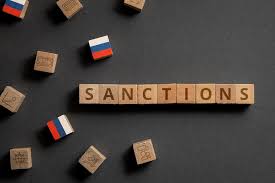OFAC Ramps Up Price Cap Enforcement as Coalition Publishes Compliance Advisory for Maritime Oil Industry
Sam Finkelstein rejoins us for a posting on OFAC’s recent enforcement steps and guidance on Russian Oil Sanctions and the Maritime Industry. Sam can be reached at [email protected].

It looks like the days of Russia’s so-called “shadow fleet” are numbered. The U.S. Department of the Treasury’s Office of Foreign Assets Control (“OFAC”) announced Thursday that it had imposed sanctions on two entities, and identified as blocked property two vessels, that carried Russian crude oil priced above the international price cap on Russian oil. This action underscores the United States’ continued commitment to reducing Russia’s oil revenue as much as possible without disrupting the supply of affordable energy to international markets.
To refresh readers’ memory: in December of 2022, the United States joined an international coalition, including the G7, the European Union, and Australia, in agreeing to enforce a “Price Cap Policy” on crude oil and petroleum products of Russian origin. The policy is intended to starve Russia’s cash reserves, and in turn, Russia’s means to finance its war against Ukraine. Oil revenues constitute an outsized portion of the Russian government’s budget, and the Price Cap Policy seeks to exploit that vulnerability. The policy has largely been a success; the coalition reports that Russian oil tax revenue plummeted 45% Q1-Q3 2023 vs. Q1-Q3 2022.
But as OFAC’s latest Russia sanctions suggest, a clandestine network of rogue maritime transport operators––the shadow fleet––has coalesced, seeking to profit by evading sanctions, violating the oil price cap, and engaging in other illicit activity.
Today, OFAC announced that it had imposed sanctions against (1) UAE-based Lumber Marine SA and its vessel the SCF Primorye, which carried Novy Port crude oil priced above $75 per barrel in violation of the $60/barrel price cap; and (2) Turkïye-based Ice Pearl Navigation Corp and its vessel the YasaGolden Bosphorus, which carried Eastern Siberia Pacific Oil (“ESPO”) priced above $80 per barrel. These entities were subject to U.S. sanctions because they used U.S.-based service providers while transporting the unlawfully overpriced Russian oil.
An April 2023 OFAC alert warned ship owners, protection and indemnity clubs, and maritime flagging registries that it had received reports of “ESPO and other crudes exported via Pacific ports in the Russian Federation” trading above the price cap, and potentially violating sanctions by using “covered services” provided by U.S. persons. According to the alert, U.S. service providers who fail to conduct appropriate due diligence on all counterparties could be taken advantage of by bad faith shadow fleet actors and tricked into providing covered services for Russian oil sold above the price cap––thus exposing themselves to sanctions liability.

The shadow fleet is, in every respect, a compliance nightmare. Alongside OFAC’s related enforcement actions, the Price Cap Coalition today issued its own Advisory outlining the myriad dangers inherent to dealing with shadow fleet operators, and recommended Best Practices for industry stakeholders reduce their exposure to possible sanctions risks.
According to the Price Cap Coalition’s Advisory, shadow fleet operators are known to manipulate their Automatic Identification Systems, a practice known as “spoofing,” to conceal their Russian ports of origin. These entities tend to use dangerously old ships, often with suspect (i.e., from states that fail to meet international obligations) or outright falsified flag registrations. Vessels engaged in the shadow trade are also known to fabricate necessary safety inspection certificates and other regulatory certificates required under international conventions.
Even worse, shadow fleet operators notoriously rely on obscure, fraudulent, or nonexistent Protection & Indemnity insurance providers, operating from remote jurisdictions, who lack the capital to handle any large claims. In other words, their insurance is illusory; if disaster strikes, these entities cannot be held accountable. That lack of accountability is compounded by the fact that shadow fleet operators employ complex corporate arrangements to conceal their true ownership structures.
Given the above, it is easy to imagine how a good faith actor who fails to conduct adequate due diligence could be tricked by a shadow fleet operator into violating sanctions and undertaking a seismic hidden insurance risk. The Price Cap Coalition has issued new Recommended Actions (best practices) for industry stakeholders to adopt to remediate the shadow fleet risk.
- Require appropriately capitalized Protection & Indemnity Insurance.
- Receive classification from an International Association of Classification Societies member society.
- Promote continuous broadcast of Automatic Identification Systems (“AIS”) throughout the lifetime of a voyage.
- Monitor high-risk ship-to-ship transfers.
- Request associated shipping and ancillary costs.
- Undertake appropriate due diligence.
- Report ships that trigger concerns.
Accordingly, compliance professionals must remain vigilant in dealings with the maritime oil industry. Per OFAC, U.S. persons providing “covered services” like financing, shipping, or insurance must reject and report to OFAC any transaction that seeks to evade the Russian oil price caps. OFAC further instructed that U.S. persons should consider AIS manipulation designed to conceal a ship’s port of call as de facto evidence of price cap evasion. Likewise, OFAC has directed service providers to view a counterparty’s refusal to provide documentation showing that the oil was purchased in compliance with the price cap policy as a red flag for possible evasion of the price cap.

Today’s shadow fleet sanctions and related guidance reflect the United States and its international partners’ continued commitment to a policy of capping Russian oil prices. Now more than ever, organizations with exposure to high-risk industries, like maritime shipping, must employ cutting edge due diligence practices in order to ensure compliance with the constantly evolving suite of sanctions against Russia.















